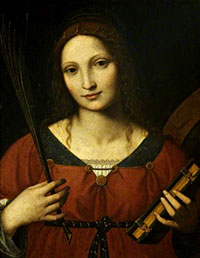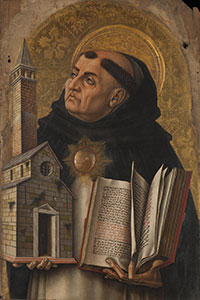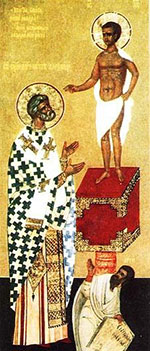The start of school is nearly here, and for students, parents and teachers, it’s the perfect opportunity to reflect and pray that the coming months will be fruitful and fun for everyone. The saints are always there to help us on our journey, so here are three saints for you to consider as the 2024-’25 school year dawns:
St. Catherine of Alexandria (c. 287-305)
Feast day: Nov. 25 Catherine is thought to have been born to a noble family in Alexandria, Egypt. Through a vision, this scholarly young woman converted to Christianity and began evangelizing others, including the wife of the pagan emperor who was persecuting Christians. According to legend, after she defied the emperor and refuted philosophers brought in to test her faith, she was imprisoned and tortured.
Catherine is thought to have been born to a noble family in Alexandria, Egypt. Through a vision, this scholarly young woman converted to Christianity and began evangelizing others, including the wife of the pagan emperor who was persecuting Christians. According to legend, after she defied the emperor and refuted philosophers brought in to test her faith, she was imprisoned and tortured.
She was put on a rotating spiked wheel; when it broke, she was beheaded. She is venerated as the Great Martyr St. Catherine in the Orthodox tradition and her voice was among those heard by St. Joan of Arc. Today, she is known as the namesake of a monastery at Mount Sinai that claims to be the oldest in the world. She is the patron saint of wheelwrights, and also a patron saint of teachers, jurists, philosophers, students and teachers.
St. Thomas Aquinas (1225-1274)
Feast day: Jan. 28
 Thomas so shocked his noble Italian family when he entered the Dominicans about 1244 that his brothers kidnapped him from the Dominicans, took him to the family’s castle, and at one point even sent a woman to seduce him – whom Thomas drove out by brandishing a poker from the fireplace. But he would not yield, and studied under St. Albert the Great, becoming a master of theology in 1256. As a priest, he showed great reverence for the liturgy and skill as a homilist.
Thomas so shocked his noble Italian family when he entered the Dominicans about 1244 that his brothers kidnapped him from the Dominicans, took him to the family’s castle, and at one point even sent a woman to seduce him – whom Thomas drove out by brandishing a poker from the fireplace. But he would not yield, and studied under St. Albert the Great, becoming a master of theology in 1256. As a priest, he showed great reverence for the liturgy and skill as a homilist.
In keeping with the Dominican order’s charism for preaching, he strove to bring his own family to a sincere practice of the faith, and largely succeeded. For the rest of his brief life, the “dumb ox,” as he was dubbed, taught, preached and wrote, producing the monumental “Summa Theologica.” The 13th century theologian showed that the Catholic faith is in harmony with philosophy and all other branches of knowledge. His thinking became enormously influential in later centuries and he was named a Doctor of the Church in 1567. In 1965, the Second Vatican Council taught that seminarians should learn “under the guidance of St. Thomas,” in order to “illumine the mysteries of salvation as completely as possible.” He is also a patron saint of academics, chastity, colleges and universities, Catholic schools and theologians.
St. Peter of Alexandria (died 311)
Feast day: Nov. 26
 Born in Alexandria, Egypt, Peter headed its catechetical school before being named bishop-patriarch in 300. In his early Church history, Eusebius called Peter an excellent teacher. Peter’s own theological writings were cited in a fifth-century dispute over Christ’s divinity and humanity. Peter fought two heresies, Arianism and Origenism, and for much of his episcopate encouraged his people to remain Christian in the face of Emperor Diocletian’s persecutions.
Born in Alexandria, Egypt, Peter headed its catechetical school before being named bishop-patriarch in 300. In his early Church history, Eusebius called Peter an excellent teacher. Peter’s own theological writings were cited in a fifth-century dispute over Christ’s divinity and humanity. Peter fought two heresies, Arianism and Origenism, and for much of his episcopate encouraged his people to remain Christian in the face of Emperor Diocletian’s persecutions.
When he eventually went into hiding, Alexandria experienced a schism, and when a new emperor renewed Christian persecutions, Peter was seized and summarily executed. He was the last Christian martyred in Alexandria by civil authorities. His instructions on how to receive “lapsed” Christians who had denied their faith back into the Church were adopted by the entire Eastern Church. Although his feast day in the Western tradition is no longer a part of the Roman Catholic Church’s universal calendar, he remains especially beloved among Catholic and Orthodox Christians of the Egyptian Coptic tradition. He is also a patron saint of Egypt.
— Catholic News Service and Catholic News Agency


